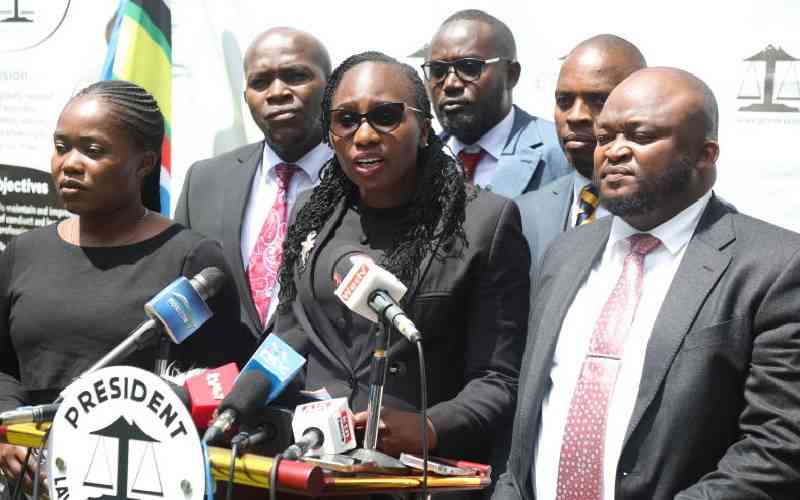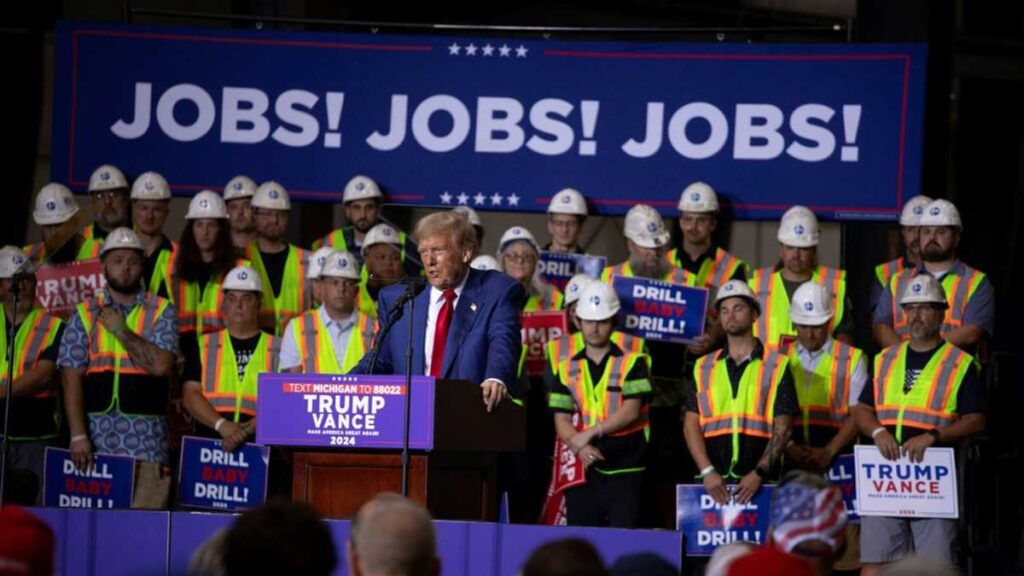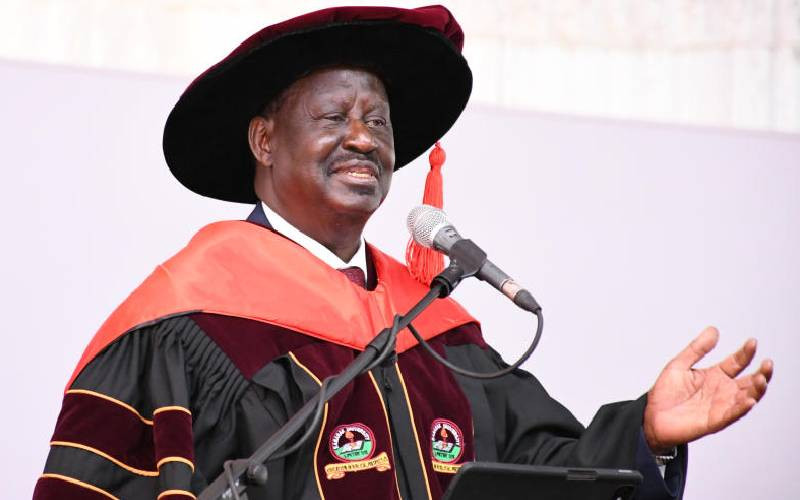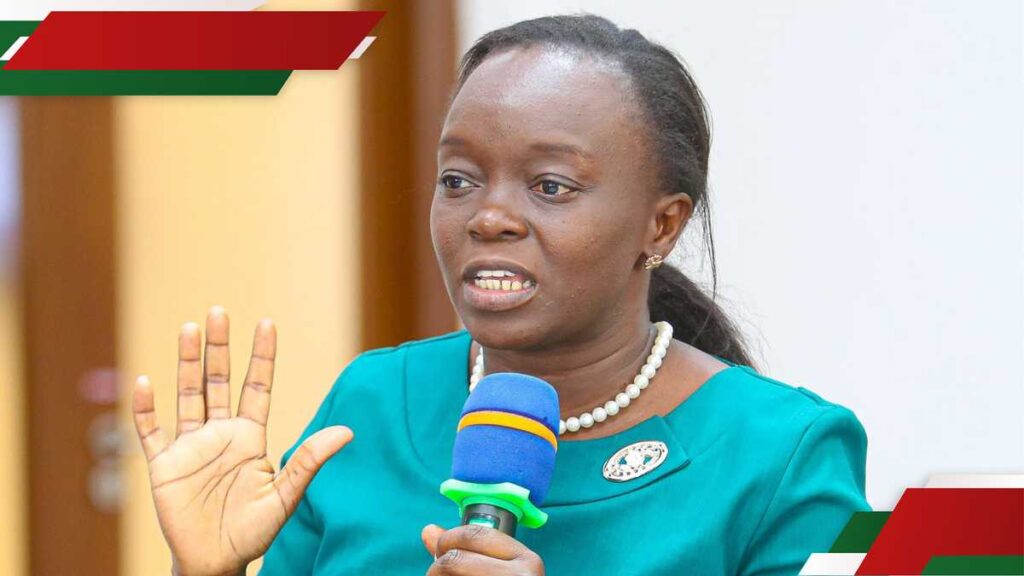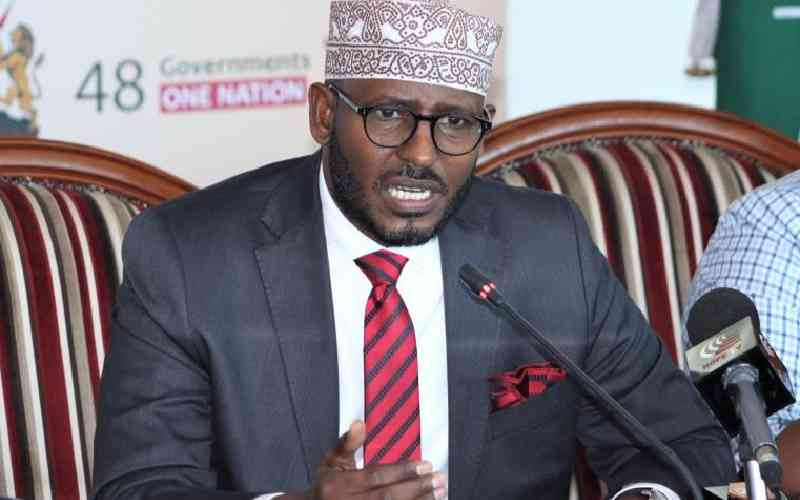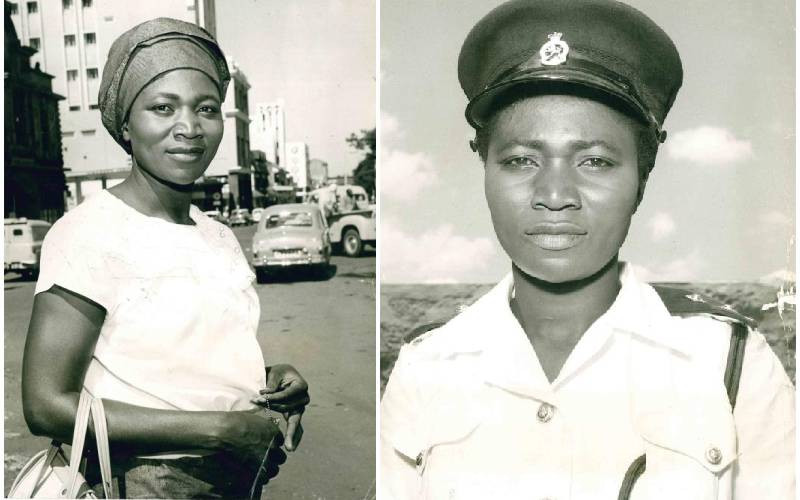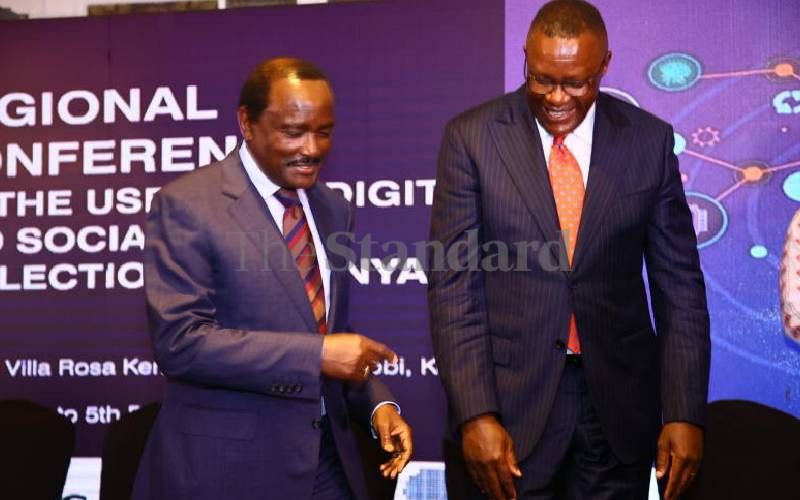Inspector General of Police Douglas Kanja is under siege following his decision to attend and address a political rally in Kieni, Nyeri County, on Tuesday.
The Law Society of Kenya (LSK), which expressed concern about the development, wants Kanja to resign if he does not apologise for attending the rally. It argues that his actions violated the Constitution and warranted his removal from office.
In a stinging statement issued on Thursday, which followed a report by the Standard, LSK president Faith Odhiambo also stated that Kanja had violated other laws that demand police officers to be impartial.
“The Law Society of Kenya demands an immediate public apology by the Inspector-General for his conduct yesterday, which is unbecoming of the position he holds. We equally demand that Mr. Kanja forthwith withdraws and restrains from engaging in any political mobilization, rallies and/or discourse, especially in his official capacity as the Inspector-General of Police,” said Odhiambo, adding that Kanja should focus on his priorities.
“We believe that the Inspector-General’s work is cut out for him, and is too demanding to allow such unpalatable sideshows, lapses in judgement, and misplaced priorities… In the alternative, we invite Mr. Kanja to step aside from the position of Inspector-General and allow the role to be occupied by an individual willing to serve all Kenyans without imposing their political biases on the people of Kenya,” the LSK president stated, arguing that the IG’s actions amounted to a violation of his oath of office.
She described Kanja’s actions as a political gimmick that could lead to the “ostracization of parts of the population that hold alternative political views from those advanced by Mr. Kanja.”
Odhiambo highlighted Article 245 (1) of the Constitution on Kanja’s responsibility to exercise independent command of the National Police Service, which raises questions about the independence of the service Kanja leads.
“For all intents and purposes, the Inspector General is constitutionally required to act impartially and is exempt from acting at the whims of any person or to advance any purpose that does not reflect the Constitutional principles of National Security. The natural conclusion is, therefore, that Mr. Kanja’s decision to attend and address a political rally was a lapse in judgment made of his own volition, for which he must bear the full consequences of law,” Odhiambo noted.
In full official regalia, Kanja accepted an invitation to “greet” a crowd by Deputy President Kithure Kindiki during President William Ruto’s ongoing tour of the Mount Kenya region, a first by a police boss.
“Are you happy to see our President here? Are you grateful? Do you want him to come back again? We are still doing our work,” Kanja, who spoke in his native Kikuyu, is seen in a livestream of the Kieni rally published on Dr Ruto’s official Facebook page and the State House Kenya’s official YouTube channel.
The lawyers’ body took issue with the remarks, which they argued betrayed Kanja’s biases, arguing they contradicted Section 23 (2) of the Leadership and Integrity Act, which “prohibits State officers from engaging in political activities that may compromise or be seen to compromise the neutrality of the offices they hold.”
“Further, Section 23 (3) particularly enjoins state officers from publicly indicating support for or opposition against any political party or candidate. We are apprehensive that the words uttered by Mr. Kanja to a politically charged audience, asking whether they were happy with the president and would wish to have him return, is riddled with connotations of political backing and constitute a veiled endorsement of the political agenda that was being appropriated at the rally,” Odhiambo wrote.
Other laws, the LSK argued Kanja broke include Section 10 (4) of the National Police Service Act, which requires the IG to uphold national values and principles prescribed by the Constitution and National Police Service Standing Orders that prohibit officers from making statements that compromise their neutrality.
“Notably, Article 232(1)(c) underscores key values of public service, requiring the Inspector-General, like all state officers, to be responsive, prompt, effective, impartial, and equitable. An inspector-general who resigns himself to political puppetry cannot be said, seen or felt to espouse impartiality or equity,” the LSK said, criticising Kanja for reducing his office “to a conduit of advancing ethno-political balkanization.”
Stay informed. Subscribe to our newsletter
On Wednesday, Police Spokesperson Muchiri Nyaga denied that Kanja had addressed a political gathering, saying images of Kanja on stage were “Artificial Intelligence-generated.”
“The IG does not attend or address political rallies. This is a hoax,” Nyaga said in a phone call interview, adding that Kanja was conducting a “tour of police stations.”
The Standard challenged him on the video clip that shows Kanja address the Kieni rally, which has since circulated online.
“No way. That is absolutely crap,” Nyaga said about the video.
Kanja’s actions were criticised widely on social media, with many raising questions about the police’s impartiality. Indeed, public trust in the police has been waning for months, with security agencies suffering a dent in their credibility over wanton abductions and killings of government critics.
Nearly 60 people were killed during last year’s youth-led protests against tax hikes, with many more injured. Several were abducted by hooded, heavily armed men, with those released narrating harrowing tales of their experience in possible torture chambers.
The public reacted by resisting arrests by plainclothes police officers, which has dangerously morphed into attacks on police stations, recently in Murang’a, Nandi and Nairobi to protest police excesses.
Kanja assumed office last September, which was at the height of the abuse of civil liberties by State security agencies and has done little to curb the vice. In most instances, he has denied police involvement but never really produced answers about why his agency had failed to curb abductions.
“The extent of this apparent contempt for the rule of law is exacerbated by the reality of Kenya’s dire and otherwise laissez-faire security situation. As things stand, the Inspector-General has failed and/or refused to report to Kenyans on who is abducting Kenyans and what action the National Police Service has taken to bring the perpetrators to book, if at all,” Odhiambo pointed out this fact in her statement.
“This calls to question the priorities of the Inspector-General, who has opted to join the political bandwagon through unprecedented involvement in rallies and being paraded as a political incentive, instead of addressing the critical issues that bedevil the people of Kenya and demand the attention of his office.”
Kanja has faced criticism for curtailing civil liberties, such as the right to protest. Last year, he issued statements prohibiting Generation Z protests, a right guaranteed by the Constitution. He was faulted for dancing to the tune of the political establishment, which led to the violent stifling of the demonstrations.
Security analyst Chris Otieno argued that Kanja had his hands, essentially, tied by the Commander-in-Chief and was following a command, but said the IG ought to distance himself from politics.
“You obey the command that will be given by a office higher than you. He did exactly that. That is the practical bit. The ideal bit, however, is that a uniformed guy is supposed to be apolitical. Completely apolitical. But the circumstances by which the ideal for this guy was founded, he had no choice but to give his due to a blood reward that the president had told him. The first question you want to ask yourself is, why was he in the entourage?” Otieno posed.
Saboti Member of Parliament Caleb Amisi, who sits in the National Assembly’s Defence and Foreign Relations Committee, argued that Kanja had done no major wrong.
“He did not campaign. We see such occurrences in our campaign rallies. When things sometimes get violent, an officer can take the stage and calm the people down with questions about whether they like their MP or political leader,” said Amisi.








